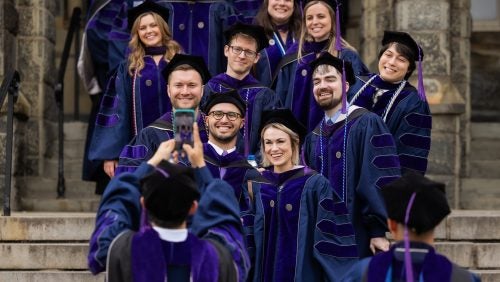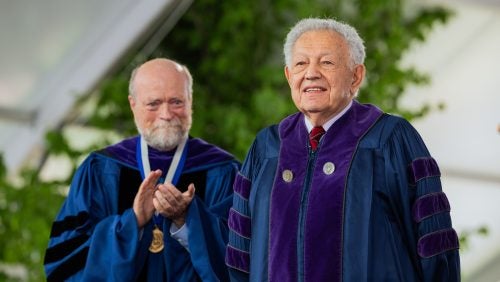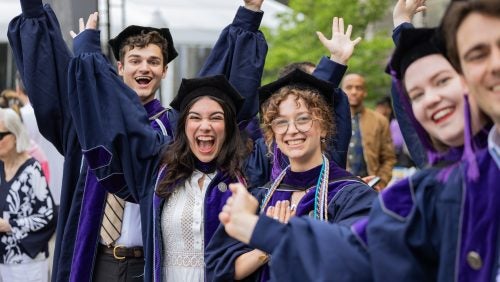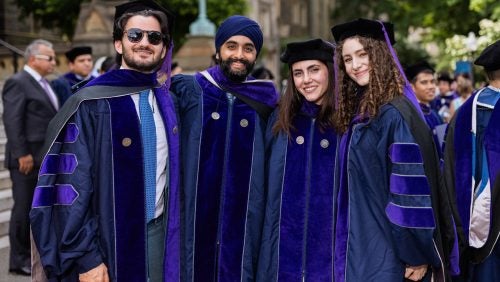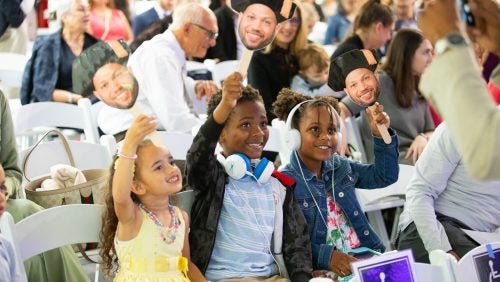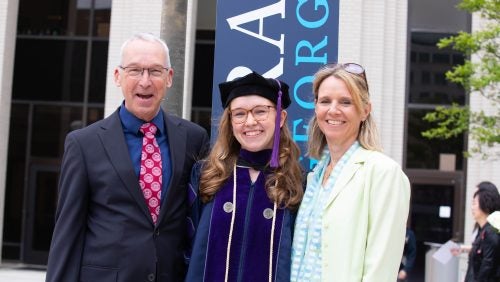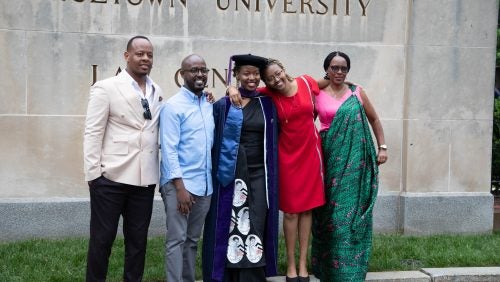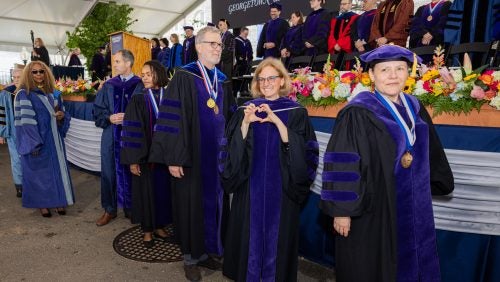Commencement 2024: Georgetown Law Graduates Celebrate, Reflect on Social Change and the Law
May 22, 2024
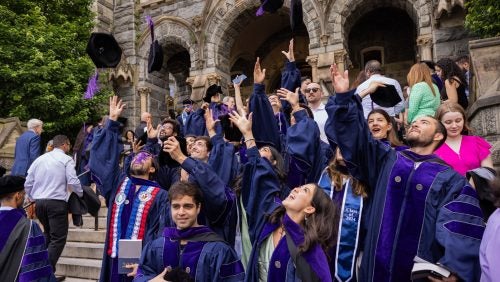
Class of 2024 graduates throw their caps in the air at Commencement. Photo credit: Elman Studio.
“Your formal education may end today, but you are not done learning,” urged Federal Reserve Chair Jerome Powell, L’79, H’24, in his address to Georgetown Law’s class of 2024. More than 1,100 spring graduates — including 641 J.D. candidates as well as 516 master of laws and 8 doctor of juridical science candidates — gathered on Georgetown University’s historic Hilltop campus to celebrate commencement on Sunday, May 19.
Powell, who has chaired the Federal Reserve System since 2018, reflected fondly on his Georgetown Law experience — from serving as editor in chief of The Georgetown Law Journal to dancing the “Time Warp” at screenings of the cult classic musical The Rocky Horror Picture Show at the now-closed Key Theatre near the Hilltop.
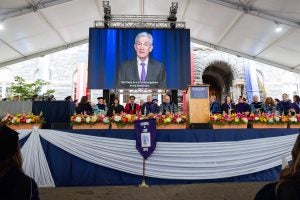
Federal Reserve Chair Jerome Powell, L’79, H’24, delivered remarks via video. Photo credit: Elman Studio.
Having tested positive for COVID-19, Powell delivered his remarks to the regalia-clad crowd virtually and received an honorary doctorate of laws degree in absentia.
Powell urged the new alumni to remain undaunted by new challenges and leadership experiences. “Assume that you will make mistakes,” he advised. “Learn from those mistakes; do not dwell excessively upon them in regret. You will fall down. Get up. Repeat cycle.”
And he encouraged the class of 2024 to work to improve the world around them. “Each of you has the capability to achieve success in any field you choose,” he said. “It is important that you also consider how to give back and use your gifts to make a difference.”
Watch the full Georgetown Law Commencement Ceremony here.
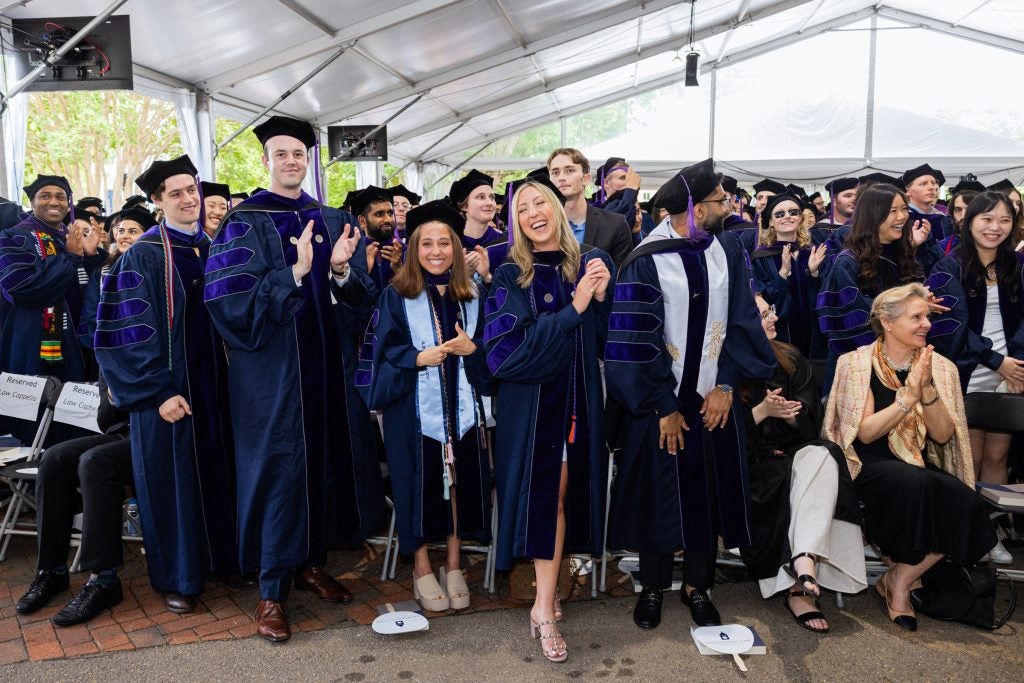
Students gathered on Georgetown University’s historic Hilltop campus. Photo credit: Elman Studio.
Celebrating a higher purpose
The call to use their legal training on behalf of others resonated with many graduates, who reflected on Georgetown Law’s public service and experiential learning opportunities as the highlight of their law school experience.
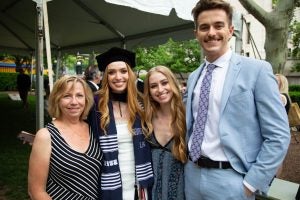
Aubrianna Mierow (second from left), L’24, credited the RISE program with helping her succeed in law school.
For Aubrianna Mierow, L’24, who took part in the Criminal Justice Clinic during her 3L year, the opportunity to represent defendants in court was a chance to practice real-life legal advocacy — and overcome any doubt that she would struggle to succeed as a lawyer.
“My own lived experiences are why I want to become a lawyer in the first place,” said Mierow, a member of the RISE program, which serves students who may have had less exposure to the legal profession before law school. “RISE provided me with a community my 1L year that has carried me throughout law school and that I know will carry me through my beginning stages as a lawyer.”
Public service was also central to Sunday’s celebration of Philip Hirschkop, L’64, H’24, who received an honorary doctorate of laws degree in recognition of his work on behalf of women, teachers and veterans, among others.
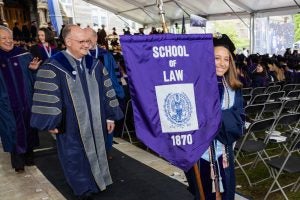
Georgetown University President John J. DeGioia (left) and Student Bar Association President Stephanie Houghton (right), L’24. Photo credit: Elman Studio.
Hirschkop, a student activist, launched his civil rights law career shortly after graduation when he served as co-counsel (with fellow Law Center graduate Bernard Cohen, L’61) to Mildred and Richard Loving in their 1967 Supreme Court case to legalize interracial marriage, Loving v. Virginia. “Throughout his career, Hirschkop chose to represent clients based on his principles, no matter the risk to his career or livelihood,” said Professor Sheryll Cashin in introducing Hirschkop to the enthusiastic audience.
Nine graduating students shared reflections on their time at the Law Center and their plans for the future — click here to read and watch.
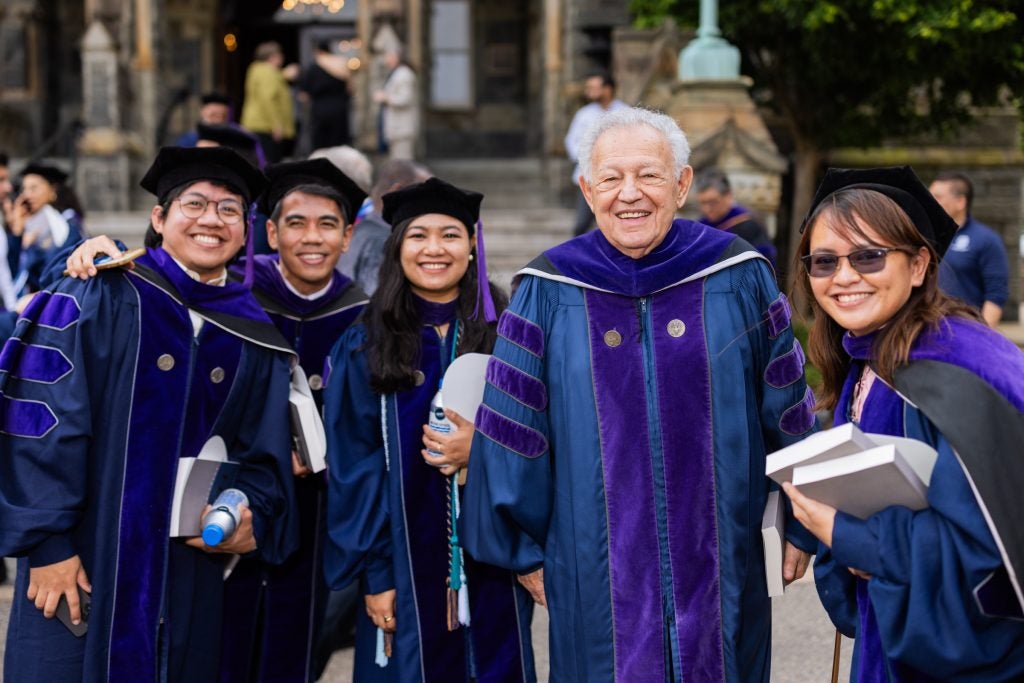
Philip Hirschkop (fourth from left), L’64, H’24, celebrated with students. Photo credit: Elman Studio.
‘At the crux of everything’
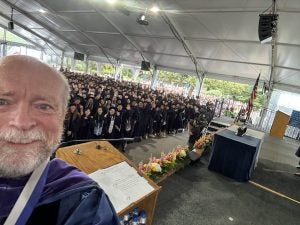
Dean William M. Treanor posed for a selfie following each Celebration Days ceremony.
Prior to Sunday’s ceremony, students gathered with family and loved ones for Celebration Days: ten smaller ceremonies held Friday and Saturday on the Georgetown Law campus, where each graduate could hear their name called and walk across the stage to collect their diploma. In keeping with the tradition he began last year, Dean William M. Treanor concluded each ceremony by snapping a selfie with the crowd.
For many graduates, Celebration Days also offered the chance to celebrate with the section-mates and classmates who began as strangers but became close friends.
“It feels pretty amazing,” said Christopher Bilicic, L’24, of the chance to graduate alongside his friend and Section 1 classmate Kamal Rettrey, L’24. “We were in the trenches together every day, in every class.”
“Whenever we had stressors, we would always call each other and be there for each other,” added Rettrey. “It was really like having a brother to have your back.”
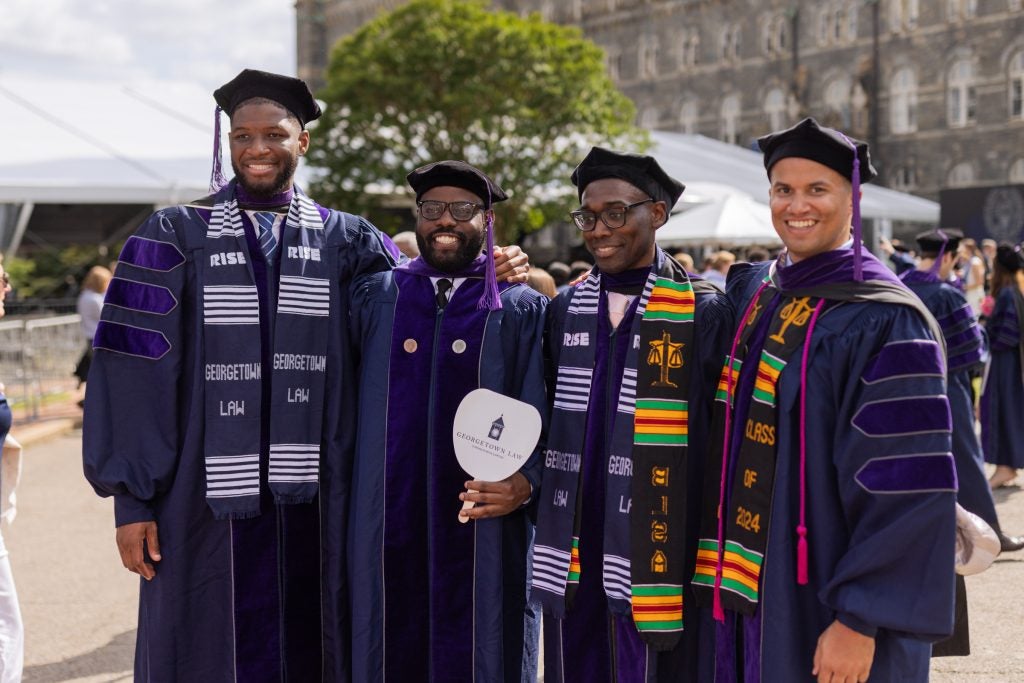
L-R: Lewis Ntolla, L’24, Stevelle Steer, L’24, Kamal Rettrey, L’24, and Robert Hunter, L’24. Photo Credit: Elman Studio.
The Celebration Days ceremonies also featured student speakers who reflected on their shared experiences — whether the J.D. students’ grueling first-year contracts and civil procedure classes, or the challenges of adjusting to life in a new country for LL.M. students, many of whom are foreign-trained attorneys.
Representing the Section 3 alternative “Curriculum B” cohort was student speaker Nick Endo, L’24, who noted his desire to attend law school in order to advocate for racial justice — a motivation inspired by the incarceration of his grandmother and the some 120,000 Japanese-Americans forcibly relocated during World War II.
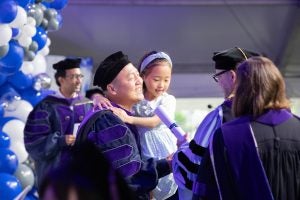
Graduates walked across the stage — some with children in tow — to collect their diplomas at Celebration Days ceremonies.
“Things got easier the further I advanced in law school,” he told the audience. “Not because the workload got lighter — it somehow got worse — but because my list of ‘whys’ was growing exponentially longer … I invite you to take a moment now and think about the ‘whys’ that brought you here to the Law Center and the ‘whys’ that kept you going.”
For Section 4 student speaker Wala Hassan, L’24, one of those “whys” was a poverty law class with Professor Peter Edelman, who helped found Head Start, the federal preschool program for low-income children — the same program that Hassan attended as a child, and that she credits with kindling the academic journey that led her to Georgetown Law. This was Edelman’s final year in the classroom, as he is retiring after more than four decades on the Georgetown Law faculty.
“Meeting Professor Edelman made me realize that at the crux of everything is a lawyer. Lawyers are on the forefront of change,” she said in her remarks. “When you’re faced with tough decisions that further injustice or fight for justice, you have incredible power in your choices … You, my fellow future lawyers, are now at the crux of everything.”
